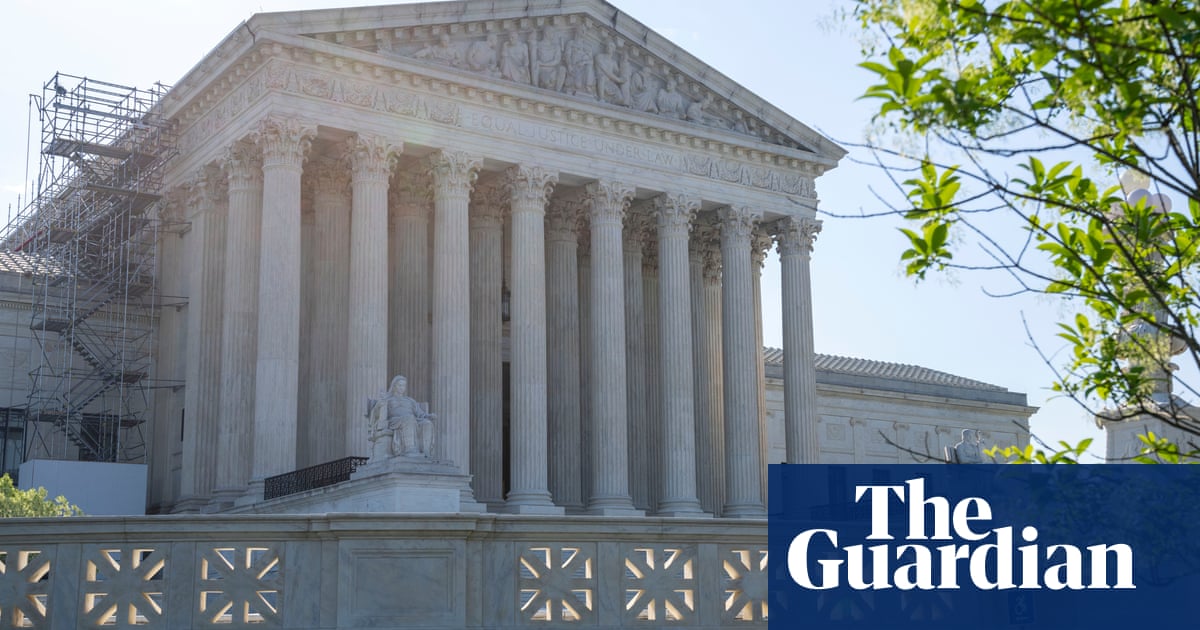
The Texas supreme court on Friday overturned a block on a state abortion ban linked to the recent US supreme court decision reversing Roe v Wade, the landmark 1973 ruling granting nationwide rights to abortion.
Friday’s order – an emergency motion for temporary relief – required parties on both sides of the abortion issue to submit briefings to the court by 7 July on a lawsuit seeking to delay implementation of so-called trigger bans, which would outlaw abortions in Texas in most circumstances.
The original stay issued by a lower court in Houston on 28 June allowed abortions up to six weeks of pregnancy to resume. The new decision has temporarily overturned that ruling, and it illustrates the legal chaos that has hit abortion providers in Texas and 12 other states with trigger bans enacted since Roe’s reversal.
The initial stay by a Houston judge this week had reassured clinics that some abortion procedures could restart. But the Texas attorney general, Ken Paxton, then asked the state’s highest court to put the order on hold.
Paxton has suggested clinics that provide an abortion during this period could be held criminally responsible if the temporary order was overturned. It wasn’t immediately clear whether those clinics would continue operating.
“These laws are confusing, unnecessary and cruel,” an attorney for the Center for Reproductive Rights, Marc Hearron, said after the order was issued on Friday night.
The center’s president and chief executive, Nancy Northup, said her group, Planned Parenthood and the American Civil Liberties Union had gone to court in 11 states to preserve abortion access since the overturning of Roe.
They include Texas, Mississippi, Louisiana, Arizona, Utah, Kentucky, Idaho, West Virginia, Florida, Ohio and Oklahoma.
“Every additional day, every additional hour that we can block a ban is making a huge difference for the patients in the waiting room,” Northup said.
In a meeting with Democratic state governors on Friday, Joe Biden reiterated his plan to challenge states that opposed abortion travel or tried to prevent access to FDA-approved termination medications.
“First, if extremist governors try to block a woman from traveling from her state that prohibits her from seeking the medical help she needs to a state that provides that care, the federal government will act to protect her bedrock right through the attorney general’s office,” the president said.
“Second, if states try to block a woman from getting medication the FDA has already approved and has been available for more than 20 years, my administration will act and protect that woman’s right to that medication.”
Biden also reiterated his support for changing congressional debating rules so that lawmakers could act to codify Roe into federal law. But he acknowledged that he needs more votes among legislators to make the necessary changes to the filibuster.
“The choice is clear: we either elect federal senators and representatives who will codify Roe, or Republicans … will try to ban abortions nationwide – nationwide,” Biden added. “This is going to go one way or the other after November.”
For now, the legal battlefield is in states where many court challenges mirror the confusion in Texas. A patchwork of anti-abortion laws, with different restrictions and penalties, and each facing legal challenges, are working their way through the courts.
Abortions in Kentucky were immediately halted as part of a six-week ban that only permits terminating pregnancies to protect people from death or serious injury. But a judge sided with abortion providers, allowing abortions up to 20 weeks to resume Friday. The state attorney general has indicated an intent to appeal.
In Louisiana, where a trigger ban went into effect, abortions have been allowed to resume until at least 8 July, when a judge will hold the first hearing in a case that granted a temporary enforcement block.
In Utah a trigger ban has also been stayed, allowing to abortions to resume in the state until 11 July.
In Florida, a law that banned abortion after 15 weeks of pregnancy was rejected by a judge who concluded that the ban violates the state constitution. For now, abortions can be performed up to 24 weeks. Florida’s attorney general, too, has said the state will appeal.
In North Dakota, the last abortion clinic will be forced to close on 28 July when a trigger ban takes effect on all abortions except in cases of rape, incest or to save the mother’s life.
Oklahoma, like Texas, passed a bill that prohibits all abortion with few exceptions. A trigger law now makes performing an abortion a felony, punishable by two to five years in prison.
And in Wyoming, a trigger ban on abortion looms with exceptions for rape, incest or if the pregnant person’s life is at risk. That law could go into effect after the state attorney general reviews its constitutionality.
In South Dakota, which has allowed abortions up to 22 weeks, a trigger ban prohibits abortion at all times unless the life of the pregnant person is in danger. The state’s Republican governor, Kristi Noem, has said she plans to bar access to abortion pills through mail.
Idaho, too, has a trigger law that makes all abortions a felony – with exceptions for rape, incest and to save the pregnant person’s life that will come into effect on 24 July. The state supreme court will hear a challenge to that law on 3 August.
In Tennessee, a federal court approved an emergency motion to let the state immediately implement a ban for abortions beyond six weeks. That comes on top of a trigger ban restricting most abortions from mid-August.
Arkansas’ trigger ban prohibits all abortions except for when the mother’s life is in danger. In Mississippi, abortions may be performed until Thursday, when the state’s trigger law takes effect, prohibiting the termination of pregnancies unless the mother’s life is at risk or in cases of a rape that was reported to law enforcement.
Missouri was one of the first states to immediately ban all abortion – except in cases of a medical emergency – after the decision. But there is confusion over whether its statutes also ban emergency contraception such as Plan B.












